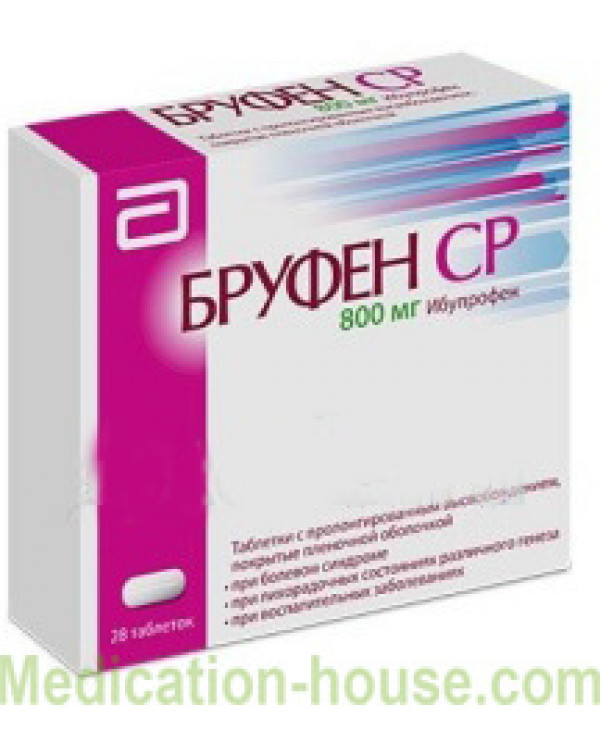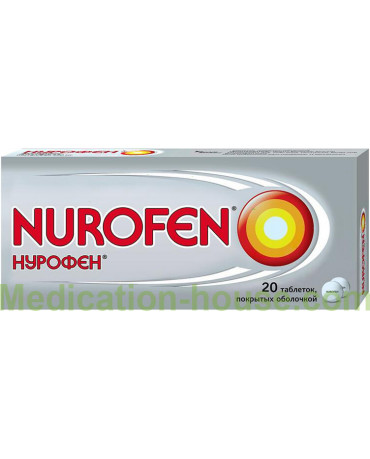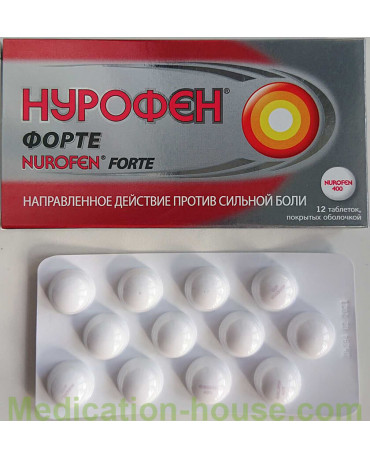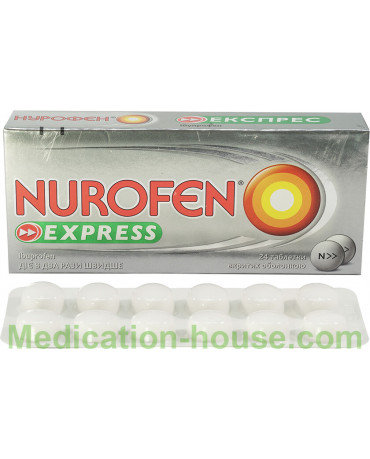Brufen SR instruction
You can buy Brufen SR here
Composition
Active ingredient: ibuprofen - 800 mg.
Excipients: xanthan gum - 196.8 mg; Povidone - 25.9 mg; stearic acid - 10.3 mg; colloidal silicon dioxide - 3.0 mg, hypromellose - 16.0 mg; Opadry white M-1-7111B - 5.0 mg; talc - 3.0 mg; Opacode S-1-9460HV brown ink traces.
Pharmacodynamics
Ibuprofen is a derivative of propionic acid, non-steroidal anti-inflammatory drug (NSAIDs), which has analgesic, anti-inflammatory and antipyretic effects. The therapeutic effect of Brufen SR is due to inhibition of the enzyme cyclooxygenase, which leads to a significant reduction in the synthesis of prostaglandins. These properties provide relief from the symptoms of inflammation, pain, and fever.
Experimental data show that the simultaneous use of ibuprofen can inhibit the effect of low doses of acetylsalicylic acid on platelet aggregation. During a single study with a single dose of ibuprofen 400 mg for 8 hours before or within 30 minutes after the application of immediate-release acetylsalicylic acid (81 mg), a decrease in the effect of acetylsalicylic acid on thromboxane formation or platelet aggregation was observed. However, due to the limited data and inaccuracies in the extrapolation of the data obtained in ex vivo conditions to the clinical situation, reliable conclusions regarding the continuous use of ibuprofen cannot be made. The development of clinically significant effects is considered unlikely with the occasional use of ibuprofen.
Pharmacokinetics
Ibuprofen is a racemic mixture of [+] S- and [-] R-enantiomers. Studies have shown that food intake does not have a noticeable effect on overall bioavailability.
Suction
Ibuprofen is rapidly absorbed in the gastrointestinal tract, bioavailability is 80 - 90%, the time to reach the maximum concentration (TCmax) in the blood plasma when using the immediate release dosage form is 1-2 hours. The prolonged dosage form of ibuprofen tablets 800 mg ensures the gradual release of the active substance , with a slower release rate compared with immediate release dosage forms and a decrease in the value of the maximum concentration (Cmax) in the blood plasma, which is igaetsya approximately 3 hours after application of ibuprofen. As a result of a prolonged absorption phase in the systemic circulation, plasma concentrations of ibuprofen are maintained longer. Thus, ibuprofen 800 mg tablets with a prolonged action is enough to take only once a day. Comparison of the pharmacokinetic profile of two 800-mg sustained-release ibuprofen tablets at a dose of 800 mg and 400 mg immediate-release ibuprofen tablets at a dose of 400 mg showed that the sustained-release dosage form reduces the range of differences between Cmax and threshold concentrations of tablets with immediate release release and maintains higher average plasma concentrations at 5, 10, 15 and 24 hours. For immediate-release tablets and sustained-release tablets, the area under the concentration-time curve (AUC) was similar.
Distribution
Ibuprofen is intensively bound to plasma proteins (99%). The volume of distribution (Vd) of ibuprofen is small and amounts to approximately 0.12 - 0.2 l / kg in adults. Metabolism
Ibuprofen is rapidly metabolized in the liver with the participation of cytochrome P450 isoenzymes, mainly CYP2C9 isoenzyme, with the formation of two major inactive metabolites - 2-hydroxybuprofen and 3-carboxybuprofen. With the use of ibuprofen inside a little less than 90% of the dose of ibuprofen can be detected in the urine in the form of oxidative metabolites and their glucuronic conjugates. A small amount of ibuprofen is excreted in the urine unchanged.
Removal
The elimination of ibuprofen through the kidneys is quick and complete. The half-life (T1 / 2) of dosage forms for immediate release is about two hours. Ibuprofen is almost completely excreted 24 hours after taking last dose.
Special patient groups
Elderly patients
In elderly patients in the absence of renal failure, there are only small, clinically insignificant differences in the pharmacokinetic profile and excretion in the urine compared with young patients. Renal failure
In patients with moderate renal insufficiency, elevated plasma levels of (S) -ibuprofen, elevated AUC values of (S) -ibuprofen, and elevated enantiomeric AUC (S / R) ratios were observed compared with healthy patients in the control group. In patients with end-stage renal disease who were on dialysis, the average free fraction of ibuprofen was about 3% compared with 1% in healthy volunteers. Severe renal dysfunction can lead to an accumulation of ibuprofen metabolites. The significance of this effect is unknown. Metabolites can be eliminated by hemodialysis.
Liver failure
The presence of alcoholic liver disease in mild or moderate liver failure did not significantly affect the pharmacokinetic parameters.
Patients with cirrhosis of the liver and moderate liver failure (6-10 on the Child-Pugh scale) treated with racemic ibuprofen showed an increase in T1 / 2, on average, 2 times, and the value of the enantiomeric ratio AUC (S / R) was significantly lower compared with healthy patients in the control group, indicating a violation of the metabolic transformation of (R) -ibuprofen into the active (S) -enantiomer.
Indications
Inflammatory and degenerative diseases: rheumatoid arthritis, including juvenile rheumatoid arthritis or Still syndrome, osteoarthritis, articular syndrome with exacerbation of gout, psoriatic arthritis, ankylosing spondylitis, spondylosis.
Diseases of the periarticular tissues, including rheumatic ones: scapulohumeral periarthritis (capsulitis), bursitis, tendonitis, tenosynovitis, tendovaginitis, back pain, sciatica.
Soft tissue damage: traumatic inflammation of soft tissues and the musculoskeletal system, sprains and strains, hematomas.
The weakening of the pain syndrome of mild or moderate severity with: headache, toothache, primary dysmenorrhea, postoperative pain, migraine, panniculitis, neuralgia, myalgia.
Inflammatory processes in the pelvis: adnexitis, algomenorrhea.
Contraindications for Brufen SR
- hypersensitivity to the active substance or to any of the excipients;
- A complete or incomplete combination of asthma, recurrent nasal polyposis and paranasal sinuses and intolerance to acetylsalicylic acid (ASA) or other NSAIDs (including in history);
- severe heart failure;
- severe liver failure;
- active liver disease;
- severe renal failure (CC less than 30 ml / min);
- progressive kidney disease;
- hemophilia and other bleeding disorders (including hypocoagulation), hemorrhagic diathesis;
- gastrointestinal bleeding or perforation in history, associated with previous use of NSAIDs;
- ulcerative colitis, Crohn's disease, recurrent peptic ulcer or gastrointestinal bleeding (determined by two or more separate episodes of confirmed ulcer or bleeding), including a history;
- condition after coronary artery bypass surgery;
- confirmed hyperkalemia;
- inflammatory bowel disease;
- intracranial hemorrhage;
- pregnancy (III trimester);
- breastfeeding period;
- children's age up to 12 years.
With caution
A single episode of erosive and ulcerative diseases of the gastrointestinal tract in history (including peptic ulcer and duodenal ulcer); simultaneous administration of oral corticosteroids (including prednisolone), anticoagulants (including warfarin), antiplatelet agents (including clopidogrel), selective serotonin reuptake inhibitors (including citalopram, fluoxetine, paroxetine, sertraline); prolonged use of NSAIDs; bronchial asthma, chronic rhinitis or allergic diseases (including in history); liver failure and / or chronic renal failure (creatinine clearance 30-60 ml / min); heart failure; arterial hypertension; coronary heart disease; cerebrovascular diseases; dyslipidemia / hyperlipidemia; diabetes; peripheral arterial disease; smoking; the presence of H. pylori infection; frequent use of alcohol; severe somatic diseases; systemic lupus erythematosus or other autoimmune diseases of the connective tissue (increased risk of aseptic meningitis); blood diseases of unknown etiology (leukopenia and anemia); liver cirrhosis with portal hypertension; nephrotic syndrome; hyperbilirubinemia; gastritis; enteritis; colitis; dehydration state; pregnancy (I-II trimester), old age.
Pregnancy and lactation
Reproductive function, pregnancy and childbirth
In the I - II trimesters of pregnancy, the drug Brufen SR can be taken only in case of strict necessity, if the potential benefit to the mother outweighs the potential risk to the fetus and child. The use of the drug Brufen SR in the III trimester of pregnancy is contraindicated, and, as with the use of all inhibitors of prostaglandin synthesis, carries the following risks to the fetus:
- cardiopulmonary toxicity (premature closure of arterial
duct and arterial hypertension);
- impaired renal function, with a further possibility of developing renal failure and reducing the volume of amniotic fluid.
During childbirth, ibuprofen, like all prostaglandin synthesis inhibitors, exposes the mother and the newborn to the following risks:
- increase bleeding time;
- inhibition of uterine contractile activity, which may lead to a delay or an increase in the duration of labor.
In this regard, it is not recommended to take ibuprofen in the period of labor. The use of ibuprofen can negatively affect female fertility and is not recommended for women planning a pregnancy.
In the case of ibuprofen, women planning pregnancy, as well as in the first or second trimester of pregnancy, should, as far as possible, reduce the dose and shorten the duration of ibuprofen therapy. In women who are faced with the problem of conception or undergoing screening due to infertility, the possibility of withdrawing ibuprofen therapy should be considered.
Breastfeeding period
Due to the limited data available on the penetration of ibuprofen into breast milk at very low concentrations, the use of Brufen SR during breastfeeding is not recommended.
Dosage and administration
Inside, after eating. Tablets should be swallowed whole, without chewing, drink plenty of water.
Adults and children aged 12 years and older: the recommended dose is 2 tablets of Brufen SR once a day, preferably at bedtime. In severe and acute conditions, the maximum daily dose is 3 tablets by separate administration. The maximum daily dose is 2400 mg.
Elderly patients: with normal kidney and liver function, correction of the dosing regimen in elderly patients is not required. In case of impaired renal function and / or liver, the dose should be selected individually. In this group of patients dosing should be carried out with caution.
Side effects of Brufen SR
Side effects observed when taking ibuprofen, characteristic of the entire class of NSAIDs. Unwanted effects can be minimized by applying the minimum effective dose for the short period of time necessary to eliminate the symptoms.
Overdose
Toxicity: In children and adults with ibuprofen at doses of less than 100 mg / kg, signs and symptoms of toxicity are usually absent. However, in some cases, symptomatic therapy may be required. In children, the appearance of toxic symptoms was observed after taking ibuprofen at doses of 400 mg / kg or more. In most patients with an overdose of ibuprofen, symptoms appear 4-6 hours after administration.
Symptoms: The most frequently reported symptoms of overdose are nausea, vomiting, abdominal pain, lethargy and drowsiness. Central nervous system (CNS) disorders include headache, tinnitus, dizziness, depression, seizures, and loss of consciousness. Also rarely reported nystagmus, metabolic acidosis, hypothermia, impaired renal function, gastrointestinal bleeding, coma, respiratory arrest, inhibition of the activity of the central nervous system and respiratory system. Cases of cardiovascular toxicity, including hypotension, bradycardia and tachycardia, have been reported. In cases of significant overdose may develop acute renal failure and liver damage. Overdosing with large doses of Brufen SR is usually well tolerated if other drugs are not taken at the same time.
Treatment: there is no specific antidote. In case of overdose, gastric lavage is recommended (within the first hour after ingestion) and supportive therapy. If there are symptoms of the gastrointestinal tract - antacids. With the development of arterial hypotension - intravenous infusions and, if required, inotropic support. Drinking, forced diuresis and symptomatic therapy (correction of CBS, electrolyte balance, blood pressure).
Interaction
Because of the reported incidence of drug interactions in some patients, Brufen SR should be used with caution in patients taking any of the following drugs:
Other NSAIDs, including selective cyclooxygenase-2 inhibitors
It is necessary to avoid simultaneous use with other NSAIDs, including selective inhibitors of cyclooxygenase-2, due to the possible additive effect.
Cardiac glycosides
NSAIDs can worsen heart failure, reduce glomerular filtration rate, and increase the concentration of cardiac glycosides in the blood plasma.
Glucocorticosteroids
With the use of NSAIDs increases the risk of gastrointestinal ulcer or bleeding.
Anticoagulants
NSAIDs can enhance the action of anticoagulants, such as warfarin or heparin. In the case of simultaneous use, it is recommended to control blood coagulation parameters.
Probenecid
Preparations containing probenecid may delay ibuprofen elimination.
Antiplatelet agents and selective serotonin reuptake inhibitors (SSRIs) (for example, clopidogrel, ticlopidine)
With the use of NSAIDs increases the risk of gastrointestinal bleeding.
Acetylsalicylic acid
As in the case of the use of other drugs containing NSAIDs, the simultaneous use of ibuprofen and acetylsalicylic acid is not recommended, since it increases the likelihood of undesirable effects.
Experimental data show that the simultaneous use of ibuprofen can inhibit the effect of low doses of acetylsalicylic acid on platelet aggregation. However, due to the limited data and inaccuracies in the extrapolation of the data obtained in ex vivo conditions to the clinical situation, reliable conclusions regarding the continuous use of ibuprofen cannot be made. The development of clinically significant effects is considered unlikely with the occasional use of ibuprofen.
Lithium preparations
NSAIDs can reduce the excretion of lithium.
Antihypertensives, beta-blockers and diuretics
NSAIDs can reduce the antihypertensive effect of antihypertensive drugs, including ACE inhibitors, angiotensin II receptor antagonists, beta-blockers and diuretics.
Also diuretics can increase the risk of nephrotoxic action of NSAIDs.
Methotrexate
NSAIDs can inhibit tubular secretion of methotrexate and reduce the clearance of methotrexate.
Cyclosporine
The use of NSAIDs increases the risk of nephrotoxicity.
Tacrolimus
With the simultaneous use of NSAIDs and tacrolimus may increase the risk of nephrotoxicity.
Zidovudine
With the simultaneous use of NSAIDs and zidovudine increases the risk of hematological toxicity. There is evidence of an increased risk of hemarthrosis and hematomas in HIV-positive patients with hemophilia who received simultaneous treatment with zidovudine and ibuprofen.
Quinolone Antibiotics
Data from animal studies show that NSAIDs may increase the risk of seizures associated with the use of quinolone antibiotics. Patients taking NSAIDs and quinolones may be at increased risk for seizures.
CYP2C9 isoenzyme inhibitors
The simultaneous use of ibuprofen and CYP2C9 isoenzyme inhibitors can enhance the effect of ibuprofen (the substrate of CYP2C9 isoenzyme). A study using voriconazole and fluconazole (inhibitors of the CYP2C9 isoenzyme) showed an increase in the content of 8 (+) - ibuprofen in the body by about 80-100%. When used simultaneously with CYP2C9 isoenzyme inhibitors, consideration should be given to reducing the dose of ibuprofen, in particular when using ibuprofen in high doses with voriconazole or fluconazole.
Sulfonylurea Preparations
NSAIDs may enhance the effect of sulfonylureas. Rare cases of hypoglycemia have been reported in patients taking both sulfonylurea and ibuprofen.
Kolestiramine
The simultaneous use of ibuprofen and colestyramine can reduce the absorption of ibuprofen in the gastrointestinal tract. However, the clinical significance of this phenomenon is unknown.
Aminoglycosides
NSAIDs can reduce the excretion of aminoglycosides.
Herbal Extracts
The simultaneous use of NSAIDs and ginkgo biloba extract may increase the risk of bleeding.
Mifepristone
In connection with the antiprostaglandin properties of NSAIDs, including acetylsalicylic acid, it is theoretically possible to reduce the effectiveness of Brufen SR. Limited evidence suggests that the simultaneous use of NSAIDs on the day of prostaglandin administration does not have an undesirable effect on the efficacy of mifepristone or the action of prostaglandins on the cervix or uterine contraction, and does not reduce the clinical effectiveness of a medical termination of pregnancy.
Special instructions for Brufen SR
Gastrointestinal bleeding, ulcer and perforation
It should be used with caution Brufen SR in patients with pentic ulcer and other gastrointestinal diseases in history, as it is possible exacerbation of these conditions.
With the use of all NSAIDs in any period of treatment reported cases of gastrointestinal bleeding, ulcers or perforations. These adverse events can be life-threatening and occur in the presence / absence of warning symptoms or a serious history of gastrointestinal diseases. The risk of gastrointestinal bleeding, ulceration or perforation increases with increasing doses of the drug Brufen SR in patients with peptic ulcer disease, especially complicated by bleeding or perforation in history, and in elderly patients. In these patients, treatment should begin with the lowest dose. In this group of patients, as well as in patients in need of concomitant therapy with acetylsalicylic acid in a low dose or other drugs that can increase the risk of gastrointestinal disease, consider the possibility of combination therapy with gastroprotectors (eg, misoprostol or proton pump inhibitors).
The simultaneous use of the drug Brufen SR and other NSAIDs, including selective cyclooxygenase-2 inhibitors (COX-2), should be avoided due to an increased risk of ulceration or bleeding (see the section "Interaction with Other Drugs").
At the initial stage of treatment, patients with a history of gastrointestinal diseases, especially elderly patients, should report the occurrence of any unusual symptoms in the abdominal cavity (especially gastrointestinal bleeding).
Brufen SR should be used with caution in patients receiving medicines at the same time that may increase the risk of ulceration or bleeding, for example, oral glucocorticosteroids, anticoagulants (including warfarin), selective serotonin reuptake inhibitors or antiplatelet drugs, including acetylsalicylic acid (see section "Interaction with other drugs").
If gastrointestinal bleeding or ulceration occurs, treatment with Brufen SR should be discontinued.
Respiratory disorders
Care should be taken when using the drug Brufen SR in patients with bronchial asthma, chronic rhinitis or allergic diseases, including a history, as cases of bronchospasm, urticaria or angioedema have been reported with this group of patients.
Heart failure, kidney and liver failure
Caution should be exercised when using the drug Brufen SR in patients with renal, hepatic or heart failure, since the use of NSAIDs can lead to a deterioration in renal function. Simultaneous therapy with multiple analgesics further increases this risk. In patients with renal, hepatic, or heart failure, the minimum effective dose should be applied for the shortest possible time and monitor renal function, especially with long-term treatment.
Cardiovascular and cerebrovascular disorders
Brufen SR should be used with caution in patients with heart failure or arterial hypertension in history, as edema has been reported with ibuprofen.
Epidemiological studies suggest that the use of ibuprofen in a high dose (2,400 mg per day) and with long-term treatment may be associated with a slight increase in the risk of arterial thrombotic complications, including myocardial infarction or stroke. In the course of epidemiological studies, it has not been proven that the use of ibuprofen in a low dose (<1200 mg per day) is associated with an increased risk of developing arterial thrombotic complications, in particular myocardial infarction.
Therapy with Brufen SR in patients with uncontrolled arterial hypertension, heart failure, coronary artery disease, peripheral artery disease and / or cerebrovascular disease should be treated only after a thorough evaluation of the benefit / risk. Such an assessment should also be carried out before the appointment of long-term treatment of patients with risk factors for the development of cardiovascular diseases (such as hypertension, hyperlipidemia, diabetes, smoking).
Dermatological disorders
When using NSAIDs, very rare cases of serious skin reactions, including life-threatening, including exfoliative dermatitis, Stevens-Johnson syndrome and toxic epidermal necrolysis have been reported. At the initial stage of therapy, patients are most at risk of developing these reactions. In most cases, the reaction develops during the first month of treatment. At the first appearance of skin rash, lesions of the mucous membrane or any other signs of hypersensitivity, the use of the drug Brufen SR should be stopped.
Renal dysfunction
Caution should be taken when starting therapy with Brufen SR in patients with significant dehydration. There is a risk of developing renal failure, especially in children and adolescents with dehydration.
Prolonged use of ibuprofen, like other NSAIDs, has led to the development of medullary necrosis of the kidney and other pathological changes in the kidneys. Also, renal toxicity was observed in patients in whom renal prostaglandins play a compensatory role in maintaining renal perfusion. The use of NSAIDs in this group of patients can lead to a dose-dependent decrease in the production of prostaglandins and, secondarily, renal blood flow, which can cause renal failure. Patients with impaired renal function, heart failure, impaired liver function, receiving diuretics, ACE inhibitors, as well as elderly patients are at an increased risk of this reaction. After the abolition of NSAIDs, as a rule, the state is restored before the start of treatment.
Hematological disorders
Brufen SR, like other NSAIDs, can inhibit platelet aggregation and increase bleeding time in healthy patients.
Aseptic meningitis
In patients treated with ibuprofen, the development of aseptic meningitis was rarely observed. Although the occurrence of aseptic meningitis is most likely in patients with systemic lupus erythematosus and related connective tissue diseases, there have been reports of cases of aseptic meningitis in patients who do not have this chronic disease.
Elderly patients
In elderly patients, the use of NSAIDs may be accompanied by an increased incidence of adverse reactions, especially perforation and gastrointestinal bleeding, which can be life-threatening.
Impact on the ability to drive trans. Wed and fur.: May affect the speed of reaction. During the period of treatment, care must be taken when driving and engaging in other potentially hazardous activities that require high concentration of attention and speed of psychomotor reactions.
Form release / dosage
Tablets of prolonged action, coated, 0.8 g
Packaging: 7, 10 or 14 tablets in a blister made of PVC / A1-foil or 60 or 100 tablets each in a plastic bottle of white color, made of high-density polyethylene, which is closed with a white screw-on cap. On 1, 2, 3, 4, 5 or 6 blisters or on 1 bottle together with the application instruction in a cardboard pack.
Storage conditions
At a temperature not higher than 25 ° С. Keep out of the reach of children.
Shelf life - 3 years. Do not use Brufen SR after the expiration date.
Terms of sell
You can buy Brufen SR without a prescription.






